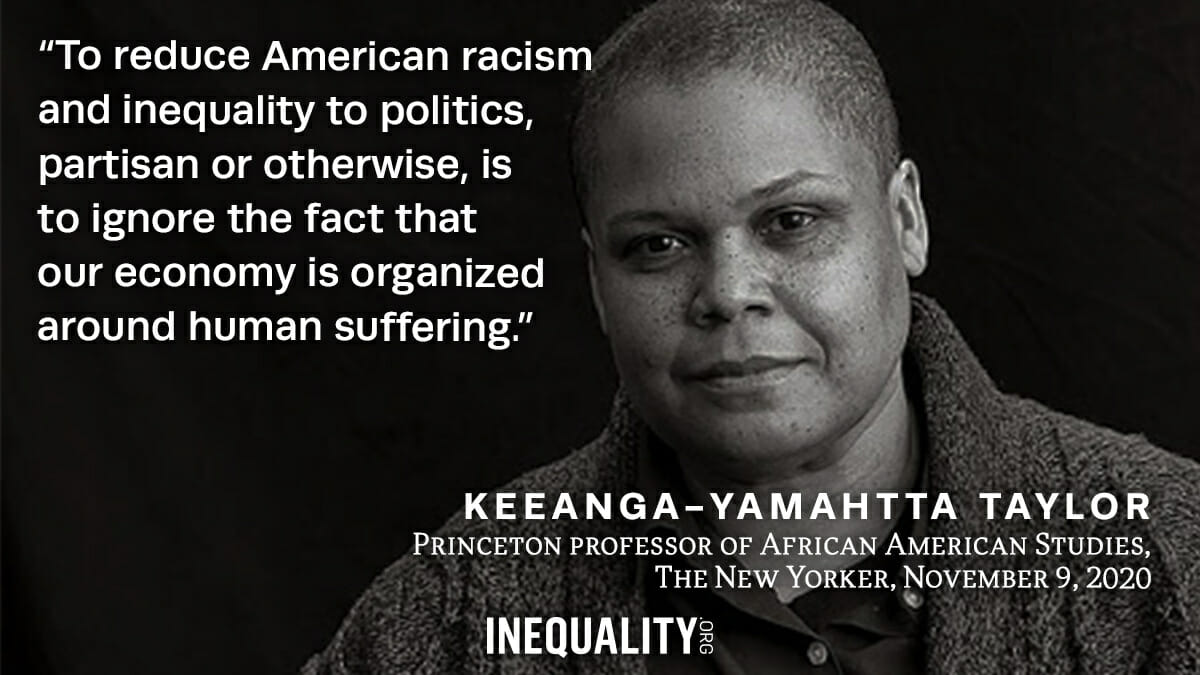| THIS WEEK |
The near-final stats on 2020 campaign spending are starting to appear, and they make for encouraging — at times — reading. On the encouraging side: Small donations to federal level campaigns made up a greater share of overall contributions in 2020 than in 2016. Just over 20 percent of 2020 campaign cash came via donations less than $200.
But that means that large donations still make up the overwhelming bulk of campaign cash, and now we have to live with the consequences. The deep pockets who made those large donations are already expecting a healthy return on their political investments. They’re pushing the new Biden administration to go slow. Our role? We have to juice the engine.
“Acquiescing to an unpopular and timid agenda that further entrenches the wealthy and the well-connected,” as Senator Elizabeth Warren puts the matter, “will lead us to more division, more anger, more inequality.”
In this week’s issue, more on the games our rich are playing and how we can, to borrow a phrase, push back better.
Chuck Collins, for the Institute for Policy Studies Inequality.org team |
|
| |
|
| INEQUALITY BY THE NUMBERS |
 |
|
|
|
| |
|
| FACES ON THE FRONTLINES |
 |
| Celebrating and Defending Postal Service Workers |
| U.S. Postmaster General Louis DeJoy, a Republican megadonor, made changes over the summer that slowed down the mail and raised fears of outright political sabotage. The American people fought back with hundreds of rallies and a barrage of lawsuits. That pressure worked, helping postal workers defend our democracy in a year that saw 65 million people vote by mail. Now we need to help postal workers build on that success in the struggle against Covid-19. The American Postal Workers Union is organizing nationwide actions November 17 to demand emergency relief and support for postal banking and other expanded services to meet pressing social needs. |
|
| |
|
| WORDS OF WISDOM |
 |
|
|
|
| |
|
PETULANT PLUTOCRAT
OF THE WEEK |
 |
| Be Good, Until Bad Starts Paying a Good Bit More |
|
Who wants to be evil? Not Google, not at the company’s start anyway. “Don’t be evil” went Google’s original credo. But Eric Schmidt, the seasoned tech exec who became Google’s CEO in 2001, always considered that slogan “the stupidest thing ever” — and dissed the slogan’s spirit on a regular basis, helping Google notch, as a Slate analysis notes, “its fair share of not-quite-not-evil missteps.” The most notorious of those: eroding Google’s original promises on user privacy after getting users hooked on Google’s free services. Schmidt would later, as the Google empire’s executive chair, enable the company’s official switch from the “Don’t be evil” mantra to “Do the Right Thing.” Google has certainly done right by Schmidt. Now retired, his personal net worth currently totals over $19 billion — and Schmidt seems hellbent on making sure no tax-happy pols put a dent on those billions. He’s busy planning to become, news reports indicate, a citizen of rich people-friendly Cyprus, a nation tax-evading oligarchs the world over now happily call home. |
|
| |
|
| BOLD SOLUTIONS |
 |
| Rising Demands on Biden to Cancel Student Debt |
| Melezia Figueroa worked hard and received scholarships to become the first in her family to go to college in the United States. But with living costs soaring and wages stagnating, she still had to take out tens of thousands of dollars in loans. Count Figueroa as just one of millions of Americans facing tough choices between paying for food, medicine, and shelter or making debt payments. At a recent Congressional Progressive Caucus Center event, Figueroa, along with Senator Elizabeth Warren and Rep. Ilhan Omar, urged the incoming Biden-Harris administration to cancel federal student debts. The near $1.7 trillion in U.S. student debt, Omar pointed out, reflects “a two-tiered education system — one for the rich whose families can afford to pay tens of thousands of dollars for higher education and the other for poor and middle class families who have to pay off that education for the rest of their lives.” |
|
| |
|
| GREED AT A GLANCE |
 |
|
|
|
| |
|
| TOO MUCH |
 |
| Will Inner-Ring Democrats Say ‘No’ to Billionaires? |
| In this fall’s presidential contest, Joe Biden and Kamala Harris ran on a campaign platform many analysts considered “the most progressive document to come out of a major national party in US history.” But the campaigns that many Democratic candidates up and down the ballot actually ran far too often ran away from anything that might overly discomfort the nation’s most comfortable — and let Donald Trump and his pals pose as champions of average people against America’s overbearing elites. We can’t continue on like that. Inequality.org co-editor Sam Pizzigati has more on why. |
|
|
|
| |
|
| MUST READS |
This week on Inequality.org
Phil Mattera, Corporate Reps Are a Small Minority of Presidential Transition Team Members. Progressives are pushing Biden and Harris to limit the influence of big corporations and Wall Street in their new administration.
Elsewhere on the Web
George Monbiot, The US was lucky to get Trump – Biden may pave the way for a more competent autocrat, Guardian. Only a president willing to fight big money and redistribute wealth can he stop the rise of someone far worse than Trump.
Harold Meyerson, The One Niche Election Victory That Most Delights Me, American Prospect. San Francisco voters have opted to raise taxes on companies whose CEOs make wildly more than what their workers do.
Marian Wright Edelman, Millionaires and billionaires keep winning and poor children keep losing, Philadelphia Tribune. The pandemic has exposed the fragility of an economy that puts billionaires before babies.
Emma Chamberlain, Wealth taxes in foreign countries, Wealth Tax Commission. In handy chart form, a new UK look at the wealth taxes that already exist, with some historical context that goes back to 1848.
Liko Smith-Doo, Income Inequality Disenfranchises Citizens, Berkeley High Jacket. Economic inequality lets the wealthy change the narrative to favor themselves and their interests, and that leaves an unknowing populace with less motivation to participate in politics or vote.
Ryan Zickgraf, Illinois Progressives Wanted To Tax the Rich. A Right-Wing Billionaire Helped Defeat Them, Jacobin. Almost single-handedly.
Jenice Robinson, Biden’s Economic Policy Agenda Deserves Serious Debate, Not Obstruction, JustTaxes. What consequences will Republicans face if their Senate leader obstructs a policy agenda that addresses some of the most pressing challenges of our time, including economic inequality?
David Sirota, Can Joe Biden avoid Obama’s mistakes? He must – for the future of the party, Guardian. Why Biden should launch his first 100 days by introducing legislation to honor his campaign promises to boost the minimum wage, strengthen unions, and raise taxes on billionaires. |
|
| |
|
| A FINAL FIGURE |
 |
|
|
|
| |
|
|